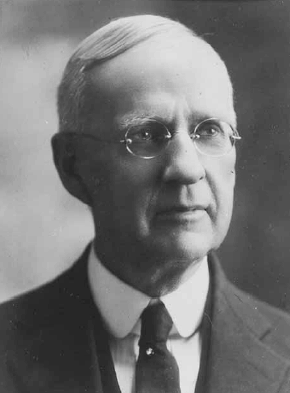Difference between revisions of "Rudger Clawson"
| Line 1: | Line 1: | ||
| − | [[image:128-1.gif|217x294px|left]] | + | [[image:128-1.gif|217x294px|thumb|left]] |
'''Rudger Clawson''' was born March 12, 1857 in [[Salt Lake City]], Utah, to Hiram Bradley Clawson and Margaret Gay Judd. Raised as a member of [http://comeuntochrist.org The Church of Jesus Christ of Latter-day Saints], he was called to several leadership positions, most notable of which were the Holy Apostleship on October 10, 1898, second counselor to [[Lorenzo Snow]] on October 6, 1901, and President of the Quorum of the Twelve on March 17, 1921. His term of service as a member of the [[First Presidency]] was a short five days due to the death of President Snow. His service as President of the Quorum of the Twelve Apostles was 22 years.[https://en.wikipedia.org/wiki/Rudger_Clawson] Previously, he had served as [[Acting President of the Quorum of the Twelve Apostles]] (November 23, 1918–March 17, 1921). | '''Rudger Clawson''' was born March 12, 1857 in [[Salt Lake City]], Utah, to Hiram Bradley Clawson and Margaret Gay Judd. Raised as a member of [http://comeuntochrist.org The Church of Jesus Christ of Latter-day Saints], he was called to several leadership positions, most notable of which were the Holy Apostleship on October 10, 1898, second counselor to [[Lorenzo Snow]] on October 6, 1901, and President of the Quorum of the Twelve on March 17, 1921. His term of service as a member of the [[First Presidency]] was a short five days due to the death of President Snow. His service as President of the Quorum of the Twelve Apostles was 22 years.[https://en.wikipedia.org/wiki/Rudger_Clawson] Previously, he had served as [[Acting President of the Quorum of the Twelve Apostles]] (November 23, 1918–March 17, 1921). | ||
Revision as of 11:38, 31 March 2023
Rudger Clawson was born March 12, 1857 in Salt Lake City, Utah, to Hiram Bradley Clawson and Margaret Gay Judd. Raised as a member of The Church of Jesus Christ of Latter-day Saints, he was called to several leadership positions, most notable of which were the Holy Apostleship on October 10, 1898, second counselor to Lorenzo Snow on October 6, 1901, and President of the Quorum of the Twelve on March 17, 1921. His term of service as a member of the First Presidency was a short five days due to the death of President Snow. His service as President of the Quorum of the Twelve Apostles was 22 years.[1] Previously, he had served as Acting President of the Quorum of the Twelve Apostles (November 23, 1918–March 17, 1921).
He married three times and fathered eleven children.
As a young man, he served as a missionary in Georgia. He and his companion, Joseph Standing, encountered persecution toward the Church and its members and on July 21, 1879, while standing at Varnell Station, they were surrounded by an angry mob of anti-Mormons. The mob led them into woods and verbally accosted them for an hour. Standing had picked up a pistol a member of the mob had left unguarded on a nearby tree stump and pointed it toward the mob, commanding them to surrender. In response, Standing was immediately shot in forehead "directly above the nose"."One of the mobbers then turned and pointed to Clawson, and said, "Shoot that man!" Clawson coolly faced the mob and folded his arms. He exclaimed, "Shoot!" The mob soon dispersed in the face of Clawson's defiance and willingness to face the mob. When he went through the grueling ordeal of testifying at the trial of four of these assassins, he saw the cause of right thwarted as the court reached a verdict of “not guilty.”[2] He brought the body of his deceased missionary companion back to Salt Lake City, where a public funeral was held in the Tabernacle. Clawson became somewhat of a celebrity for his bravery that day."[3]
Clawson was the first member of the Church to be prosecuted and convicted under the infamous Edmunds Act of 1882. His jury was composed of twelve gentiles although Utah at the time was better than nine-to-one Latter-day Saint. Lydia Spencer, one of his wives refused to be sworn and was herself committed to the penitentiary in a scurrilous and ultimately failed attempt to force her to testify. Ultimately he was convicted in an unconstitutional ex post facto application of the law. As a result of his conviction he was subjected to a fine of $1500 and the extraordinarily harsh sentence of three years and six months to a federal penitentiary for which he had donated $1000 to its construction. He appealed to the Supreme Court of the United States in Clawson v. United States but was rejected. He was pardoned in 1887 by President Grover Cleveland which cut only four months off his sentence.
Rudger Clawson died June 21, 1943, in Salt Lake City, Utah, well beloved and respected by all while the names of his persecutors lie in the trash heap of history despised by those few who even bother to search them out.
